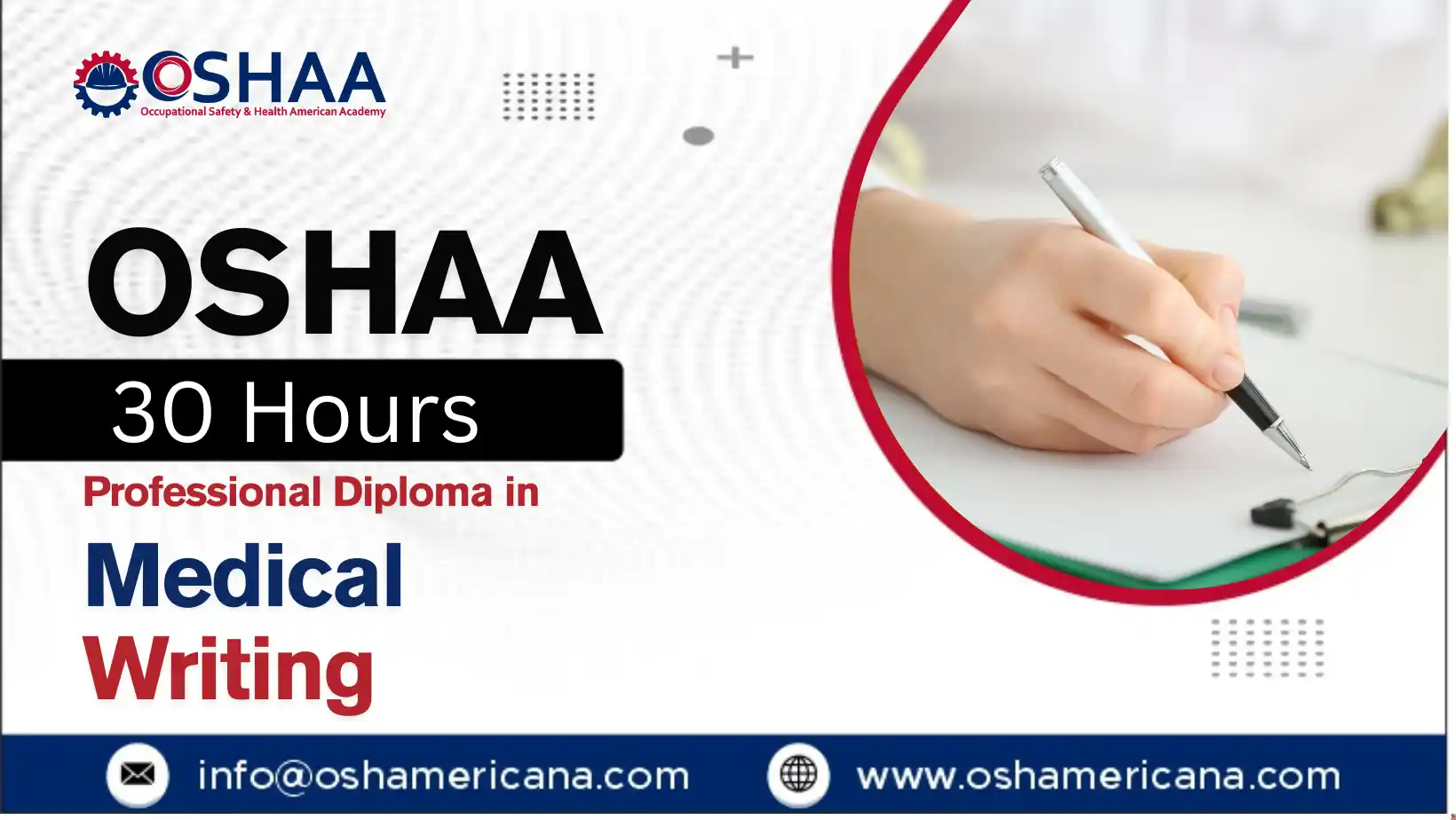Master Medical Writing Skills – OSHAA 30-Hours Diploma
Medical writing is a critical skill in today’s healthcare and pharmaceutical industries, where clarity, accuracy, and evidence-based communication are essential. The OSHAA 30-Hours Professional Diploma in Medical Writing offers a structured and practical pathway for participants to gain the knowledge and tools required to write professionally within medical and scientific contexts.
This diploma is designed for individuals aiming to begin or enhance a career in medical writing, whether within research, clinical documentation, regulatory affairs, health journalism, or public health communication. It covers the essential principles, writing styles, and documentation standards expected in professional medical content creation.
The OSHAA diploma introduces participants to the core areas of medical writing, including clinical trial documentation, scientific publications, patient education materials, and regulatory writing. With a focus on structure, terminology, ethical standards, and audience targeting, this course builds the foundation for high-quality medical communication.
Participants will explore how to present complex scientific data clearly and effectively, while maintaining accuracy and compliance with industry norms. The course also addresses referencing, medical literature review, plagiarism, and the use of plain English for patient-friendly content.
OSHAA 30-Hours Professional Diploma in Medical Writing
Study Units
Learning Outcomes
Introduction to Medical Writing and Industry Applications (3 Hours)
- Understand the scope and importance of medical writing across healthcare sectors
- Identify various types of medical documents used in clinical, regulatory, and educational settings
- Recognise the key roles medical writers play in pharmaceutical, research, and public health environments
- Explore career pathways and industry expectations in medical writing
Core Principles of Medical Language and Terminology (5 Hours)
- Develop a solid foundation in medical vocabulary and scientific language
- Accurately interpret and use medical terms in different writing contexts
- Apply appropriate language styles based on target audience and purpose
- Understand the importance of clarity, precision, and consistency in medical communication
Writing for Clinical Research: Protocols, Reports, and Abstracts (4 Hours)
- Learn the structure and components of clinical research documents
- Draft clinical protocols, case study summaries, and trial reports using accepted formats
- Understand the process of translating clinical data into reader-friendly content
- Identify ethical considerations in clinical research reporting
Regulatory Writing: Structure, Guidelines, and Submissions (4 Hours)
- Understand the types of documents required in regulatory submissions
- Familiarise with global regulatory bodies and key documentation standards
- Learn to structure and prepare documents such as Investigator’s Brochures and Summary of Product Characteristics
- Apply compliance and accuracy in line with regulatory expectations
Scientific Writing for Journals and Peer-Reviewed Publications (5 Hours)
- Understand the structure of scientific manuscripts including IMRAD format
- Learn techniques for writing clear abstracts, introductions, and discussion sections
- Follow author guidelines for journal submission and peer-review requirements
- Apply referencing styles and citation practices used in scientific literature
Writing Patient Education and Public Health Materials (3 Hours)
- Learn how to simplify complex medical information for public understanding
- Adapt tone and style for non-specialist audiences, ensuring clarity and accessibility
- Create educational materials that promote informed health decisions
- Apply health literacy principles in document design and content development
Medical Journalism and Health Content for Media (4 Hours)
- Understand the principles of health communication in journalism and digital media
- Write compelling, factual, and balanced articles on medical topics for public audiences
- Recognise the role of media ethics, source credibility, and fact-checking in health reporting
- Explore content creation for blogs, magazines, websites, and social platforms
Referencing Systems, Literature Reviews, and Source Evaluation (2 Hours)
- Learn to conduct targeted literature searches using academic databases
- Evaluate the reliability and relevance of scientific sources
- Apply citation and referencing formats such as Vancouver, APA, and MLA
- Understand how to summarise and integrate evidence into medical writing effectively
Course Benefits – OSHAA 30-Hours Professional Diploma in Medical Writing
- Equips participants with practical skills to produce high-quality, accurate, and structured medical documents
- Enhances professional writing capabilities for clinical, regulatory, scientific, and public health communication
- Builds confidence in using correct medical terminology and scientific language across diverse writing formats
- Provides in-depth knowledge of global industry standards, submission processes, and ethical writing practices
- Strengthens the ability to communicate complex health information clearly to varied audiences
- Offers a recognised professional credential that supports career development in the healthcare, pharmaceutical, and scientific sectors
- Prepares participants for freelance and remote opportunities in medical writing and editing
- Encourages critical thinking, attention to detail, and evidence-based writing approaches
- Enables better collaboration with healthcare professionals, researchers, and communication teams
- Supports continued professional development for individuals working in health education, media, research, or public health roles
The OSHAA 30-Hours Professional Diploma in Medical Writing is designed for participants who are:
- Healthcare professionals, researchers, or academics seeking to transition into medical or scientific writing
- Science or life science graduates aiming to pursue careers in clinical documentation or regulatory communication
- Public health professionals responsible for drafting reports, policies, or patient education content
- Journalists and content creators looking to specialise in health, wellness, and medical reporting
- Individuals involved in pharmaceutical, biotech, or medical publishing sectors
- Professionals in health communication, medical affairs, or clinical research roles who wish to enhance their written communication skills
- Freelancers or remote workers seeking to enter the growing field of medical writing
This course is suitable for participants with varying levels of experience who are interested in developing a structured, ethical, and professionally recognised approach to medical writing.







